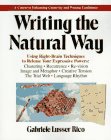Holiday Gift Ideas for Writers
My surgeon has scheduled for me to go under the knife in the morning to put my clavicle back together. In case you didn't know, the clavicle is the collar bone. Now, you probably actually did know that. I, on the other hand, didn't until about three weeks ago. Up to that point I thought a clavicle was a musical instrument in the horn family.
If you frequent here often, you may have arrived looking for a clavicle status report and you're wondering why in the world what you've found instead is a list of holiday gift recommendations for writers.
Fact is, I have no idea how lucid I'll be on Tuesday, if I'm still inhabiting the planet. (One never knows.) And I want to participate in this month's Celebration of Christian Fiction, a monthly blogging round-robin slated for November's topic to hit cyberworld this Tuesday. The topic of choice is recommended books for writers wanting to develop their talent.
So here goes...
I’m assuming the home library already has Strunk and White’s thinner-than-a-pocket-Bible book, The Elements of Style, as well as William Zinsser’s On Writing Well. I’m also assuming the aspiring fiction writer already owns Self-Editing for Fiction Writers (Browne and King) and Techniques of the Selling Writer (Swain). In addition to these I recommend some lesser-known possibilities:

Writing the Natural Way – Gabriele Rico
I’ve used this book with grad-school creative writing students for something like seven years now. (I’ve lost track.) The results have, at times, been phenomenal. Each chapter includes some instruction followed by related writing exercises. Get the 1983 edition, if you can. (You can find used copies online for about a buck.) The newer one has some Zen flavoring that’s refreshingly absent in the earlier one.
To give you a sampling: One of the exercises involves writing about the painting, American Gothic. You know the picture: the daughter stands with her Stoic-looking farmer father, who holds a pitchfork—the picture Grant Wood signed on the Dad's denim. One student turned in an assignment that started something like this:
10:15 AM
Husband and wife present with problems down on the farm.
Husband wearing Grant Wood designer overalls.
But wife’s dress made from recycled curtains.
Get this one to help you develop your creativity as a writer.

The Poet’s Handbook – Judson Jerome
Centuries ago, people didn’t write prose as an art form. All good writing was metrical: “To be or not to be—that is the question.” Not so today. As a culture, we’re pitiful when it comes to poetry. Case in point: We all know people who shamelessly share their rhymes that include matches of words such as “apples” with “Snapple.” What’s worse is when such people link the almost-but-not-quite rhyme with meter that falls forty yards short of a touchdown:
Roses are red
Violets are like apples.
Angels in heaven
Know I really, really love Snapple.
(Please do not quote me on that. Or, if you feel you must quote me on that, please, please feel no obligation to credit your source.)
For the person wishing to nail metrical writing, Judson Jerome’s the best teacher out there. This book helps aspiring poets know the tools to use and when. But it also provides the fiction writer with tools for crafting more aesthetically pleasing prose.

Of Fiction and Faith: Twelve American Writers Talk about Their Vision and Work – W. Dale Brown
Next on my list of recommended resources we find a book of interviews with twelve pretty much fantastic general-market writers who at least loosely associate themselves with Christianity and who seek to write redemptive prose. They include Frederick Buechner and Garrison Keillor, as well as some lesser-knowns, such as Elizabeth Dewberry.
These writers talk about the myriad ways of manifesting their faith in their work. We learn what Christian writers have influenced them, how they’ve handled crushing reviews, and especially how they’ve communicated their faith without sounding trite.

The Eleventh Draft: Craft and the Writing Life from the Iowa Writers' Workshop – Frank Conroy
This hard-to-find collection of writings about writing is by those who’ve taught at the Iowa Writers’ Workshop. (Duh. You read the title.) The “Ralston” essay may be the funniest I’ve ever read. Also, as a teacher, I identify with the observation of essayist Scott Spencer, who notes that his students write too carefully for fear of embarrassing themselves. He warns that a writer who’s afraid to get edgy-honest “is finally no more effective than a firefighter who will not smash in windows.”
Dramatica Pro
Last on the list is the most expensive, but the most fun. It’s for the computer-geek fiction writer, and it costs about two hundred bucks.
Dramatica Pro is like a creative partner who asks you either fifty (short version) or two hundred (long version) questions about your plot, characters, voice, and setting. It’s not that it writes the story for you; it just makes you think and answer so you close gaping holes in the plot, tighten characters, nail themes. And all the while you feel like you’re playing a game.
On this one, be sure to get the latest version.
As twentieth-century writer, William Saroyan, wrote, "Writing is the hardest way of earning a living--with the possible exception of wrestling alligators." Hopefully with the help of a few well-chosen tools, you or the beloved writer in your life can exchange some of the "blood, toil, tears, and sweat" for pure, unadulterated joy.
Happy Holidays!
